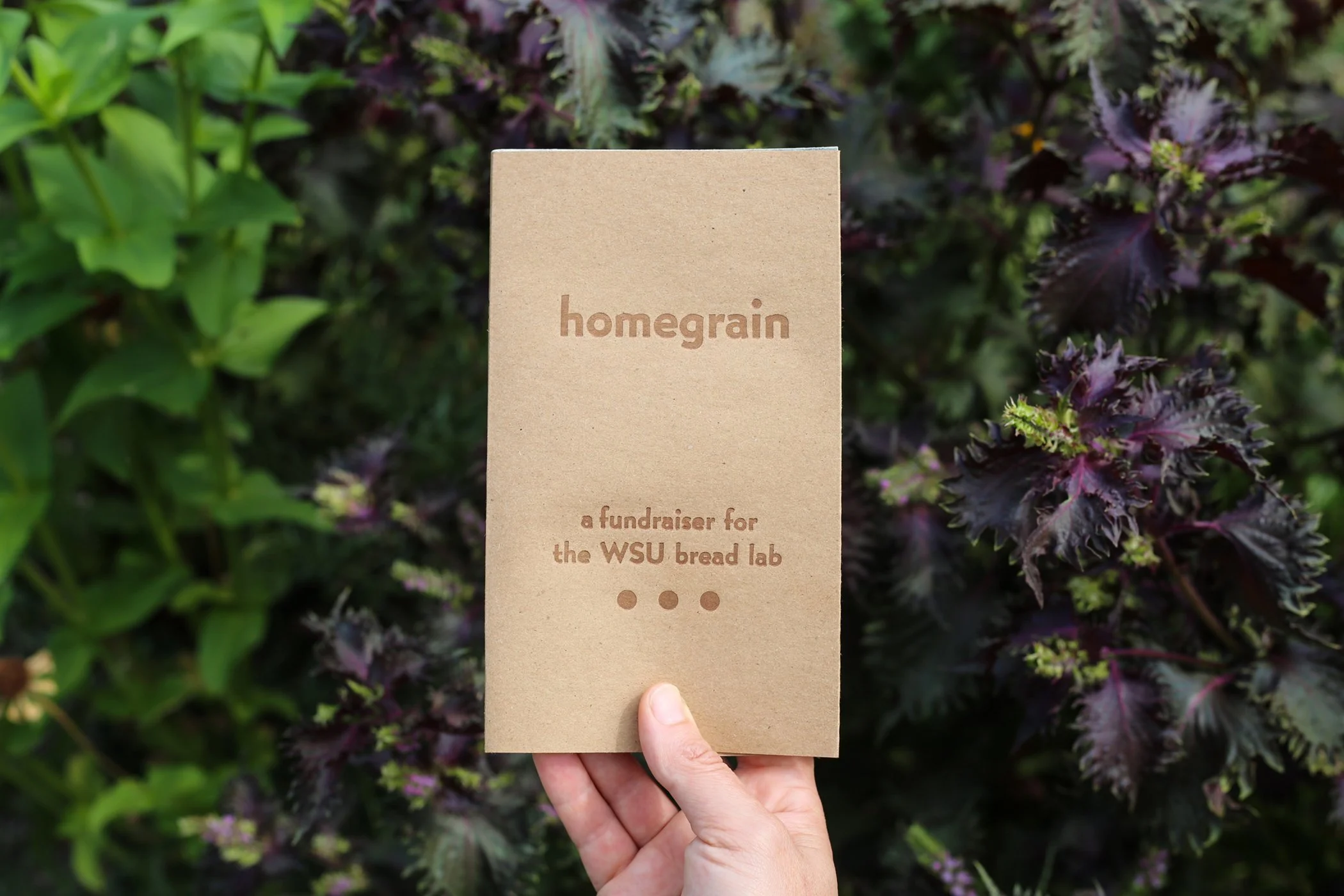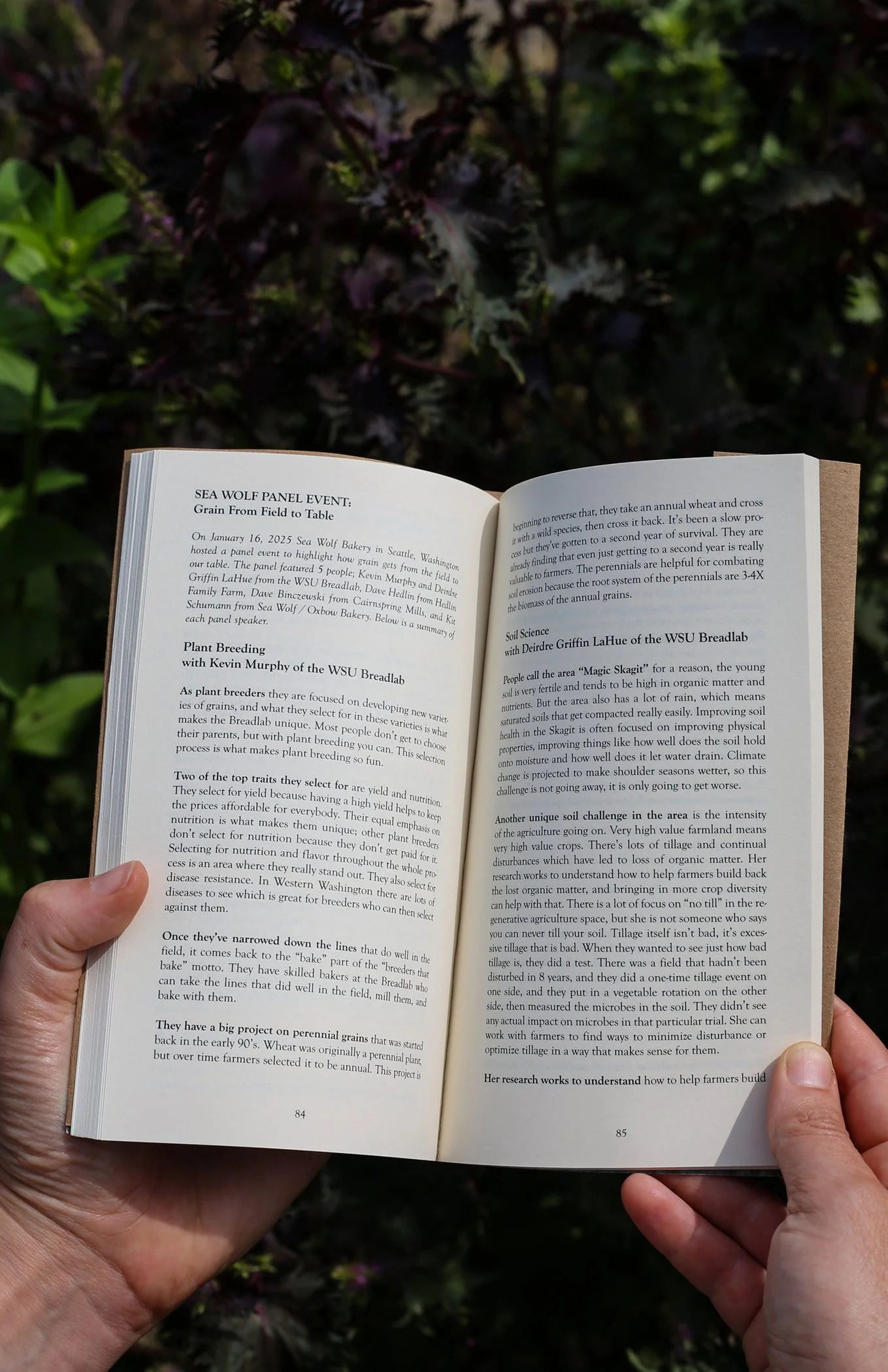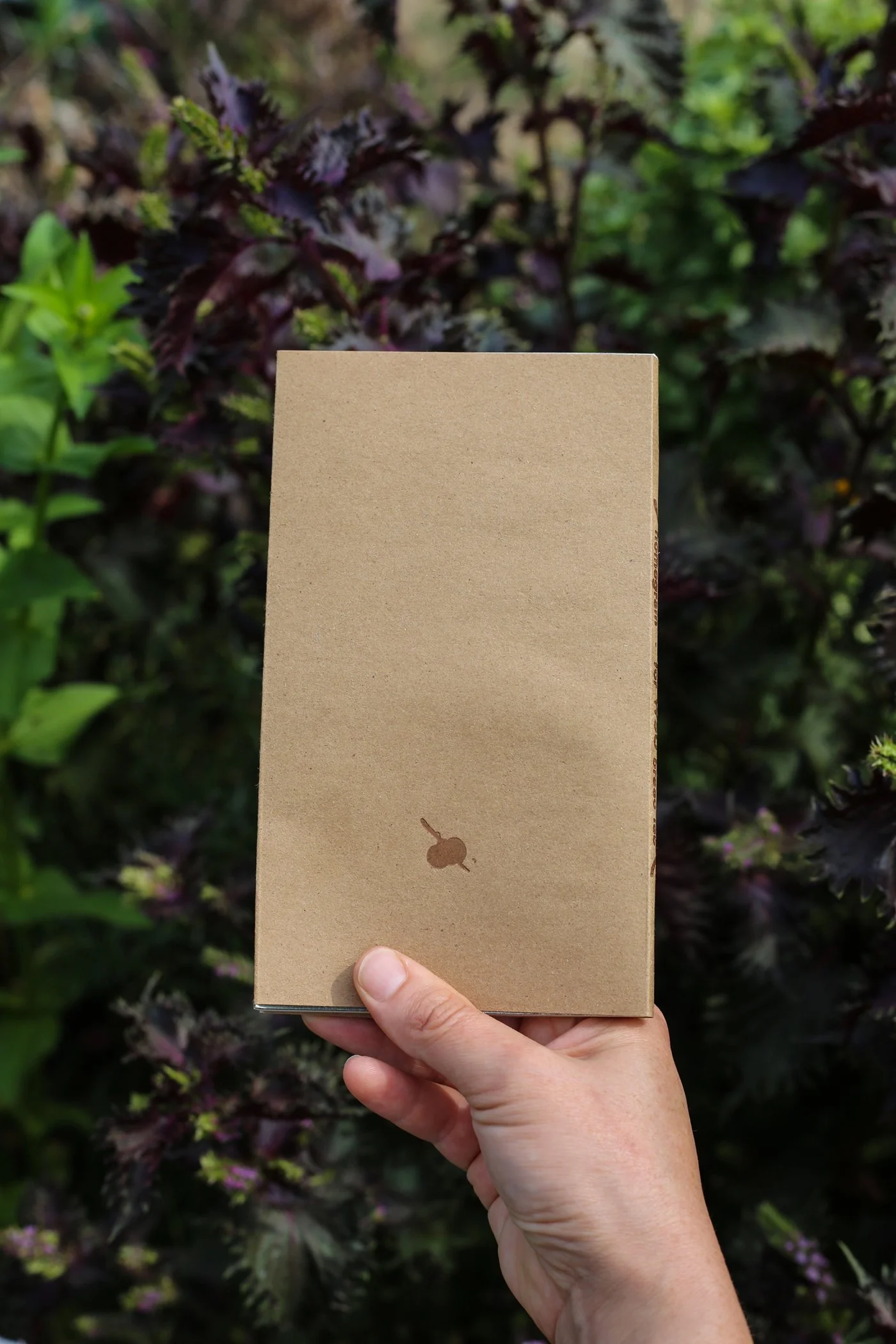HOMEGRAIN – A fundraiser for the WSU Breadlab






HOMEGRAIN – A fundraiser for the WSU Breadlab
Note: If you’ve arrived here via the link in the Wordloaf newsletter and are disappointed to see the book has sold out – fear not! So many folks ordered the book in support of the bread lab that we’ve mobilized to get a second printing out soon. PRE-ORDER the 2nd printing here!
‘Homegrain’ is a book celebrating the grain scene of Washington State – from seed scientists to growers to millers to bakers and those who grow and mill or mill and bake or bake and make pottery and other delightful combinations. It was put together by a frequent Two Plum Press reader, Alexandra Garcia, to benefit the Washington State University Breadlab.
The Breadlab is a unique and exciting organization – not what you’d expect any large American University to just have. They are innovating, they are reviving, they are helping the local grain economy with every single class, event, and project they embark on. I distinctly remember when visiting a magical bakery in Copenhagen, Denmark and speaking to a French baker there, he knew about the WSU Breadlab – that was his point of reference for the entire region of the Pacific Northwest. In April of 2025 the funding was cut (paused? Whatever this current hellscape of sea change for the good things in this world is calling the tumult) for a good portion of the Breadlab’s work, and Alex immediately sprang into action – morphing this book she’d already been hoping to make into something with a new, more urgent, vividly clear purpose.
The book contains a collection of interviews with bakers, growers, millers, and organizers about the work that they do, punctuated by information about grain varieties and in the case of bakeries, their weekly menus. I see this as being an incredibly handy tool for those in or visiting Washington – a deep dive into the ethos behind these operations and some practical, trip-influencing information to boot. There are also essays (a highlight on rye from a rye scholar and the editor’s visits to some of these operations), some beautiful paintings, some handy recipes, and a couple poems to punctuate the experience at the end.
115 pages on recycled cream colored paper. Covers featuring coppery metallic ink on recycled brown craft paper. 100% of proceeds will be donated directly to the Breadlab. The book debuted at the Buckwheat Festival on August 8th, 2025 and is available online for the first time now!
excerpt:
Ryan Lee of Baker/Potter
I want to support the people growing food in my community and region. I want to ensure they are able to continue do- ing the good work they are doing. The local grain economy has lagged behind the general local food economy and I’m interested in changing that by finding ways to create sales and processing channels for farmers.
I love how baking bread is both very simple and incredibly complicated. Wild yeasted breads are living things. Every week the bread/process is a little different. In ways no one other than me likely notices but every week I start the process with the goal of making the best bread I can. It’s never perfect and that’s what keeps me coming back.
I hope we make people feel nourished and connected to a local grain economy. Also connected to us bakers. We’re re- ally small and I like that our customers are able to buy bread directly from us bakers. That’s pretty rare.
Grains are remarkably diverse in flavor, color, baking quality, appearance and that there is a long long history of humans selecting and eating various grains all over the world.
Fresh is best. We mill 100% of what we use in house. We are also dedicated to sourcing only organic grains direct from farmers in WA that are good stewards of the land.
The bread we make with local grains (especially because it’s whole grain) is quite different from what customers are famil- iar with. We largely cater to a smaller niche market. A lot of education of customers is required.
Nathan Hodges & Sage Dilts
of Barn Owl Bakery & Heritage Grains
What is your flour philosophy? Soft power! In our climate and soils and without any added fertilizers the grains we grow tend to be quite low in protein. Generally to get good strong flour that makes big bubbles and stretchy dough a farmer needs to put a good amount of nitrogen on the fields - and they do because that’s what bakers mostly want. But we take the reverse approach - start with simple low energy low input farming and the flour that comes of it is the flour of the place, of the field that year.
What does supporting a local grain economy mean to you?
Our goal is to be a part of building a local grain economy in the islands that goes beyond a single farm or bakery - it’s easy to grow grain, it’s hard to grow enough to feed a community and improve soil at the same time. We want to see longer term rotations in the island’s fields that build soil through livestock rotation, cover cropping, small grains, and hay. Out of that comes livestock feed, healthy pastures, and enough grain and flour to supply all the local bakeries and stores that want to use island grains. We see a local grain economy as a catalyst for restoring the health of our island landscapes and building community resilience through locally adapted seed and staple crops.
Barn Owl Grain List:
Fortuna – A hard red spring wheat bred in the 1960s in Mon- tana, Fortuna was originally brought to Lopez 10 years ago by O.J. Lougheed, a lifelong researcher of heritage grains, who sought to find nutritious old varieties that grew well on Lopez. Fortuna has excellent baking quality, rich and sweet flavor, and robust stripe rust resistance.
Selkirk – A 1953 Canadian hard red spring wheat out of Manitoba, Selkirk has great baking quality, good disease resis- tance, and a balanced flavor.
Chiddam Blanc de Mars – Originally brought out of the seed banks by Monica Spiller in California, Chiddam Blanc is a 1927 French selection of a British landrace wheat. Classed as a soft or medium white spring wheat, we absolutely love the flavor of this grain and use it in all of our pastries and mixed into our whole grain doughs to lighten and sweeten the bread.
Halland – An unimproved Swedish landrace, this is a highly diverse, very adaptable, excellent yielding, amazing flavor wheat. We are honored to partner with this grain and look forward to many years of collaboration and learning as we work together to flourish in our thin island soils.
Dala – A 1910 field selection from Dalarna, a Swedish land- race, Dala has a mild and alluring flavor, excellent yield and disease resistance, and that deep rooted nutrition.
Bishop – A 1904 cross of Gehun and Ladoga, Bishop is mind bendingly mild, buttery, and sweet. A hard white spring heri- tage wheat with strong yield, good disease resistance, and an undeniable charm. Expect to see this one a lot in the coming years.
WSU Purple – Back in 2016 Colin Curwen-McAdams was 27
a wheat breeder and researcher at WSU interested in peren- nial and colorful wheats. He gifted us a selection of unstable purple and blue wheats and we’ve been growing them out ever since. Amazingly rich earthy flavor and surprisingly good baking quality.
Hourani – Hourani is a stunning and scrubby drought toler- ant ancient durum from the Hourani plateau of Southwest Syria. Collected in the 1920’s by the legendary seed explorer Nikolai Vavilov the same variety has also been found in ar- cheological sites dating back to 2000 B.C. It has large hard golden kernels perfect for semolina, peasant pastas, and flat- breads. With flavors of ripe plums, golden raisin, apricot ker- nel, and limestone a small amount can imbue any bread with a rich golden hue and deep flavor.
Rainbow Barley – While most of the grains we grow are iden- tity preserved, meaning we use actual variety names, Rainbow Barley is our own creation. It’s a population of hulless barleys, selected for colorful seeds. Containing Jet, Lomboc, Oscar, Ethiopian, Arabian Blue, Tibetan Purple, and new varieties each year as we find them, this mix of beautiful barleys is al- ways a joy to see in the field and the combine.
Ethiopian Blue Tinge Emmer – We originally got this seed from Uprising Seeds in Bellingham and have been growing it since 2015. A hulless emmer with a gorgeous iridescent purple seed, this grain as the most intensely sweet and rich flavor of any of our grains.
Horsedrawn Rye – One of our farming partners Ken Akopi- antz at Horsedrawn Farm got some cover crop rye seed many many years ago and has been growing it out and saving seed on Lopez ever since. We love its mild flavor, easy baking qual- ity, and deep roots.









